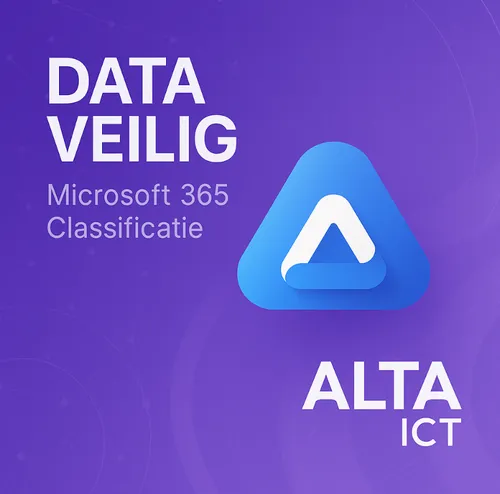
Knowledge base
October 12, 2025
Classifying Data in Microsoft 365
Introduction: why data classification matters now
At a time when Dutch companies are processing more and more digital information – from quotes and contracts to personnel data and confidential emails – the risk of data breaches is growing daily. One wrongly forwarded e-mail can lead to serious consequences: fines from the Dutch Data Authority, reputational damage or loss of customer trust.
According to research, more than 60% of Dutch SMEs struggle with challenges around data governance and compliance. The strict AVG regulations in particular mean that mishandling sensitive data is not a minor misstep, but a strategic risk.
The solution? Classify and label data within Microsoft 365. This gives organizations a grip on their information and employees immediately know how to handle data.
At ALTA-ICT, ISO27001- and NEN7510-certified, we guide companies throughout the Netherlands with proven methodologies for data classification in Microsoft 365 – including measurable ROI and fully AVG-proof.
What is data classification and why essential in the Netherlands?
Data classification means classifying information into categories such as Public, Internal or Confidential. This helps employees immediately recognize how sensitive data should be handled.
For Dutch companies, this is crucial because:
-
AVG/GDPR sets strict rules on storage and sharing of personal data.
-
Sector-specific standards such as NEN7510 (healthcare) and BIO (government) impose additional requirements.
-
Fines and penalties for violations can reach millions of dollars.
In addition, data classification contributes to business continuity and competitive advantage: companies that have their information management in order gain trust from customers and partners.
How data classification works in Microsoft 365 – practical guide
Step 1: Inventory and planning
-
Identify what types of data your organization processes.
-
Conduct a privacy impact assessment in accordance with the Personal Data Authority.
-
ALTA-ICT supports with an AVG and NEN7510 audit specifically focused on Microsoft 365.
Step 2: Design and preparation
-
Configure confidentiality labels in Microsoft Purview (formerly Compliance Center).
-
Set policy: who is allowed to open, edit or share Confidential documents?
-
Integrate with existing compliance frameworks, such as DigiD or DNB requirements.
Step 3: Implementation in Microsoft 365
-
Apply labels in Outlook, Word, Teams and SharePoint.
-
Automatic detection and labeling based on content (e.g., BSN, IBAN).
-
Training for employees to increase awareness and proper use.
Step 4: Optimization and monitoring
-
Continuous monitoring through Microsoft 365 compliance dashboards.
-
Periodic evaluation in accordance with ISO9001 continuous improvement.
-
24/7 monitoring by ALTA-ICT’s SOC (Security Operations Center).
Common mistakes in data classification
-
No policy, but technology – Setting labels without clear governance leads to confusion.
-
Inadequate training – Employees do not recognize labels and use them incorrectly.
-
Too broad or too complex – Too many categories create ambiguity.
-
Ignoring compliance – Labels not aligned with AVG or NEN7510.
-
One-time implementation – Without ongoing evaluation, classification loses effectiveness.
At ALTA-ICT, we prevent these mistakes through a proven roadmap and practical training programs.
ROI: why classification pays off for Dutch SMEs
-
40% fewer data breaches through clear labeling and prevention.
-
Up to €820,000 savings by avoiding AVG fines (average AP sanction 2024).
-
Productivity gains of 25% as employees know how to use documents faster.
-
Competitive advantage: demonstrable compliance in tenders and contracts.
ALTA-ICT approach: making a difference
At ALTA-ICT, we do not take a one-size-fits-all approach, but rather:
- ISO27001, ISO9001 and NEN7510 certified processes
- Dutch compliance specialization (AVG, BIO, DigiD, sector-specific)
- Personal coaching for SMEs, healthcare, government and financial sectors
- 24/7 monitoring and support from our local team
Our clients experience immediate measurable results: reduced risk, increased confidence and better control of business information.
Frequently asked questions about data classification
Should every company in the Netherlands use data classification?
Yes, especially when personal data or confidential business information is processed. AVG requires appropriate measures.
Can I make labels mandatory in Microsoft 365?
Yes, with Microsoft Purview you can enforce labels on storage or shipping.
What does an implementation cost?
Costs depend on size and complexity, but for SMEs, projects often start as low as a few thousand euros with quick ROI.
Is this only relevant to large companies?
No, SMEs in particular are often more at risk due to limited security resources.
How does ALTA-ICT support my organization?
We offer end-to-end guidance: audit, implementation, training and 24/7 monitoring.
Conclusion
Classifying data in Microsoft 365 is not a luxury, but a necessity for Dutch companies that want to work AVG-compliant and avoid reputational damage. With the right approach, you not only increase your security level, but also realize tangible benefits in efficiency and trust.
???? Want to know how your organization can benefit directly from data classification? Book a free consultation with our experts today at alta-ict.co.uk/gratis-consultation.
Want to know more?
